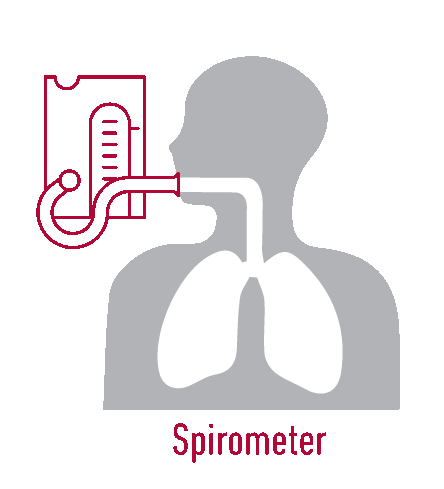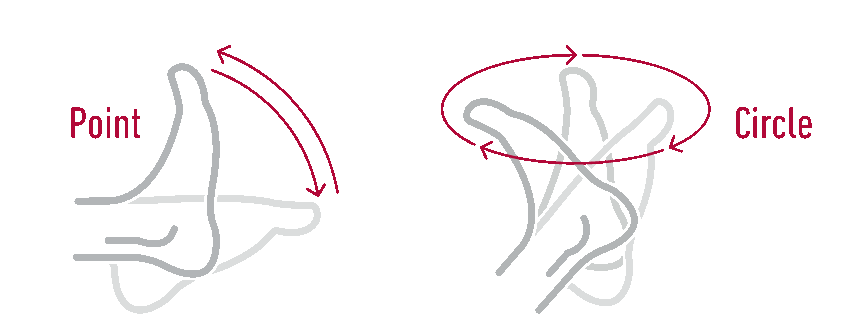RECOVER: A Guide to Pre- and Post-Operative Exercises and Activity for Patients Admitted to the Hospital
Incentive Spirometer
After your operation, you will need to take deep breaths and cough several times each hour to keep your lungs fully expanded. By deep breathing and coughing, you will help speed your recovery and reduce the risk of developing breathing problems. To help you with deep breathing and coughing exercises, your doctor may order an incentive spirometer. This special tool will help you cough and deep breathe better. It will also let you and your nurse know how deeply you are breathing. A respiratory therapist or nurse will show you how to use the incentive spirometer.
How to Use the Incentive Spirometer
-
Sit on the edge of the bed or sit up as much as you can in bed.

- Hold the spirometer upright.
- Put the mouthpiece in your mouth and tightly seal your lips around the mouthpiece.
- Breathe in slowly and as deeply as possible. Watch the disc inside the spirometer rise to the top. Try to keep the disc between the two arrows on the spirometer as you breathe in.
- Hold your breath as long as possible and then exhale slowly as you watch the disc fall.
- Rest.
- Repeat the sets above 5–10 more times.
- Do this as frequently as told to you by your nurse or therapist.
- After using the incentive spirometer, follow the steps below.
Coughing and Deep Breathing
How to Take a Deep Breath
To deep breathe correctly, practice the following exercises two or three times a day before surgery. That way, you will be able to do it more easily after surgery.
- Lay down on your back and get into a comfortable position. You may want to bend your knees slightly as you try to relax.
- Place one hand on your chest and the other over your upper abdomen. Close your mouth and breathe in deeply through your nose. As you do, concentrate on feeling your abdomen rise without expanding your chest. If the hand on your abdomen rises as you breathe in, you are doing the exercise right.
- Hold your breath for five seconds.
- Now “Purse” or pucker your lips, as though you are about to whistle. Breathe out completely through your lips using your abdominal muscles. Squeeze all the air out.
- Rest several seconds, then continue the exercise until you have done it 5–10 times.
If you are having abdominal surgery, you may be more comfortable if you hold a small pillow over your incision. Lace your fingers together across the pillow to hold it in place. Then do the deep breathing exercise, as described.
Note: This exercise may be done while lying on your side, sitting, standing, or as you are turning in bed. It should be doneat least 5–10 times every hour.
How to Cough
After your surgery, the nurse will remind you to do coughing exercises. Coughing helps keep your lungs free of mucus.
You should practice coughing before your surgery, so you can do it easily afterwards.
- Sit on the edge of your bed. Bend your body slightly forward. (After surgery, you may also perform this exercise while lying in a comfortable position instead of sitting at the edge of the bed.)
- If you are having chest or abdominal surgery, you will be more comfortable if you hold a small pillow over your incision as you cough.
- To begin your coughing exercise, take two slow, deep breaths.
- Take a third deep breath and hold it for five seconds. Let the air out by coughing forcefully.
- Repeat this exercise at least once more.
Oral (Mouth) Care
Good oral (mouth) care is important for many reasons. Besides helping to prevent dental problems, good mouth care can help lower your risk of certain infections such as pneumonia (lung infection). Your health-care team will tell you about mouth care based on your specific needs. This may include use of a toothbrush (please bring a new toothbrush with you to the hospital), toothpaste, and/or salt and soda rinses. You will also be told how often you should do mouth care. It is also very important to take proper care of dentures. Please remember your denture supplies.
Ask Questions
If anything in these information sheets is unclear to you, please ask you nurse or therapist for help.
Getting Up and Moving Around After Surgery
Getting up and moving around about as soon as possible while in the hospital can help lower your risk of developing problems, such as soreness, weakness, getting tired easily, and swelling. Walking and other physical activity have been shown to help prevent serious problems, including pneumonia (lung infection) and blood clots. Your health-care team is committed to helping you get up and move as soon as possible. They will tell you when you will be getting up for the first time, how often you will need to get up, and for how long you need to stay up. If you are having difficulty moving, feel unsteady, or have questions about exercising, ask your doctor for a referral to physical therapy.
How to Exercise your Shoulders
Start with your hands on your thighs. Lift your arms up and back down slowly and in a controlled manner. Breathe in while raising your arms, and breathe out while letting them down. Do this 10 times in a row, five times a day.
How to Exercise Your Legs and Feet
Perform the following exercises:
1. Push the toes of both feet toward the foot of the bed. Relax both feet.
2. Point toes toward the chin. Relax both feet.
3. Circle both ankles, first to the right, then to the left. Repeat three times. Relax.
4. Sit in a chair for good posture. Without slouching, straighten your leg in front of you and point toes up to the ceiling.
Return to a resting position. Do one leg at a time. Repeat 10 times on each side. Do 3-4 times a day.

In addition to leg exercises, compression sleeves that go from the ankle to below the knee will be applied before going to the operating room. These help to maintain adequate circulation during and after surgery.
Bed Positioning
Unless your doctor orders positioning restrictions based on your particular operation, you will be encouraged to keep the head of the bed up at all times while you are resting in bed. This makes it easier to clear things out of your throat.
Pain Management
Good pain control is important for many reasons, including helping you to get up and move around. Pain control options include different medications. Your health-care team will work with you to develop a plan to meet your needs. If your pain is not under control, please tell your nurse.
Video: How to Take Opioids Safely After Surgery
If you have more questions, call your surgeon or the Pre-Admission Testing Office at 215-728-2566.